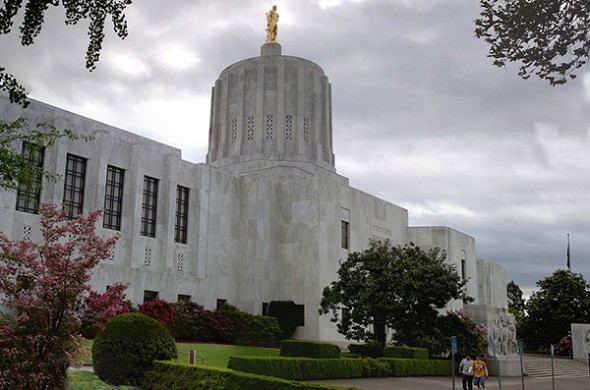CUB Protects Oregonians’ Digital Privacy By Way Of HB 2866
Posted on February 5, 2019 by Samuel Pastrick
Tags, Telecommunications

Today in Oregon, and across the US, effective data transparency and privacy consumer protections are glaringly absent. CUB intends to tackle this issue during the 2019 Oregon legislative session. CUB, with ACLU of Oregon and OSPIRG (Oregon’s Public Research Institute affiliate), authored HB 2866, Oregon’s Data Transparency and Privacy Protection Act (DATPA).
Why is CUB so concerned with this topic?
Ease of access to and affordable use of the Internet is a necessity in the 21st century. Broadband Internet Access Service (BIAS) is an essential utility service on par with electricity or even water. CUB continues to lead in Salem as an advocate for public policies that benefit and protect the interests of residential BIAS customers. Companies, especially large and multinational ones, operate almost entirely on and benefit from the Internet; either that or they deliver BIAS to homes and a growing number of digital electronic devices.
In delivery of their services, these same companies collect, analyze, derive, sell, lease, or otherwise transfer vast quantities of their customers’ personal information. In fact, this represents the entire business model for an increasing number of companies. While we all know this to be true, public policy at both the federal and state levels has fallen far behind the curve. Though, in fairness, the astonishing pace of technological innovation, especially in the last decade, is a major factor in this ‘policy lag.’
Companies have always sought to learn more about their customers. Market research is critical for any business, including nonprofits. However, this once implied an organization’s ability to better understand the ‘market’ in which they operate, i.e. the wants and needs of their customers, not hyper-granular intelligence about individuals’ lives. Nowadays, market research leverages a limitless ‘datasphere’ whereby companies, or even individuals, can easily sell and obtain personal information as a product in and of itself.
CUB partnered with ACLU and OSPIRG to craft the DATPA because our three groups recognize an unaddressed policy issue. We refuse to wait for the federal government to address this issue in the same way CUB refuses to wait for federal action to address climate change. The time to act is now, in 2019, and so CUB asks readers of this blog to stand with our coalition in support of Oregon DATPA during the 2019 Oregon legislative session.
What is the Oregon DATPA?
Oregon DATPA’s policy components include “Right to Know” (R2K) empowerment for individuals residing in Oregon (the phrase used in the legislation is “resident individual”) with additional provisions targeting “geolocation” and “audiovisual” information.
What is R2K and why is it so important?
R2K empowers Oregonians to submit a once-yearly data request to a business or organizational entity operating in Oregon, to learn the extent to which that entity has collected, analyzed, derived, sold, leased, or otherwise transferred the Oregonian’s “personal information” in the previous 24 months. Examples of personal information include name, email address, race, ethnicity, sexual or gender preference, religious or political affiliation, or any piece or category of information that, if combined with other pieces or categories, could conceivably re-identify an individual.
R2K’s underlying concept is that Oregonians have a fundamental right to know what happens with their personal information after they wittingly or unwittingly share it with an entity. What personal information is collected about them? Where does the information go after collection? To whom is the information sold, leased, or otherwise transferred?
What about geolocation and audiovisual information?
Additional DATPA provisions require a business entity collecting, analyzing, deriving, selling, leasing, or otherwise transferring an Oregonian’s geolocation or audiovisual information to first disclose intent and methodology, and receive express consent from that individual. Geolocation refers to data displaying the location of a digital electronic device (cellular phone, tablet, etc.) on a map or similar depiction. Audiovisual information means video or audio of movements, gestures, utterances, conversations, interactions, or behaviors.
CUB anticipates steep opposition from certain industry groups. We are nevertheless confident in our approach, as well as the importance of protecting and representing the interests of everyday Oregonians when it comes to their data transparency and privacy protection.
To keep up with CUB, like us on Facebook and follow us on Twitter!




09/05/22 | 0 Comments | CUB Protects Oregonians’ Digital Privacy By Way Of HB 2866